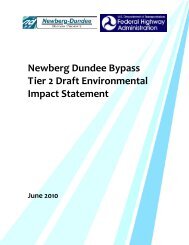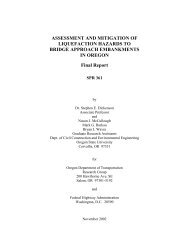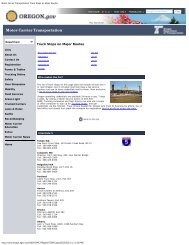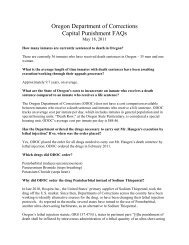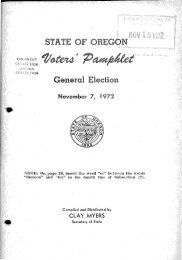Oregon Balance of State HIV/AIDS Housing & Services Systems ...
Oregon Balance of State HIV/AIDS Housing & Services Systems ...
Oregon Balance of State HIV/AIDS Housing & Services Systems ...
Create successful ePaper yourself
Turn your PDF publications into a flip-book with our unique Google optimized e-Paper software.
A-62 Appendices—<strong>Oregon</strong> <strong>HIV</strong>/<strong>AIDS</strong> <strong>Housing</strong> and <strong>Services</strong> <strong>Systems</strong> Integration Plan<br />
MEDIAN FAMILY INCOME (MFI) The amount, as determined by HUD, which divides an area’s income<br />
distribution into two equal groups, one having incomes above this amount, one having incomes below. MFI<br />
is based on the most recent U.S. Census family income data and is adjusted annually for inflation. HUD and<br />
the U.S. Census Bureau consider a family to be a household comprised <strong>of</strong> related individuals. For example:<br />
A family is a group <strong>of</strong> two people or more (one <strong>of</strong> whom is the householder) related by birth, marriage, or<br />
adoption and residing together; all such people (including related subfamily members) are considered as<br />
members <strong>of</strong> one family. This differs from Median Household Income, which is the median income <strong>of</strong> the<br />
householder and all people living in the house over the age <strong>of</strong> 15, regardless <strong>of</strong> relation to the householder.<br />
MEDICAID A program jointly funded by the states and the federal government (U.S. Department <strong>of</strong> Health<br />
and Human <strong>Services</strong>) that provides medical insurance for people who are unable to afford medical care. The<br />
program focuses mainly on the needs <strong>of</strong> the elderly, people with disabilities, and children.<br />
MEDICARE A federal program under the Social Security Administration that provides health insurance to the<br />
elderly and disabled.<br />
MENTAL ILLNESS A serious and persistent mental or emotional impairment that significantly limits a<br />
person’s ability to live independently.<br />
MODERATE INCOME An individual or family whose income is between 50 percent and 80 percent <strong>of</strong> the<br />
median income for the area, as determined by the U.S. Department <strong>of</strong> <strong>Housing</strong> and Urban Development<br />
(HUD), with adjustments for smaller or larger families. HUD may establish income ceilings higher or lower<br />
than 80 percent <strong>of</strong> the median for the area if they find that such variations are necessary because <strong>of</strong> prevailing<br />
levels <strong>of</strong> construction costs or Fair Market Rents, or unusually high or low family incomes.<br />
MULTIPLY DIAGNOSED To be diagnosed with <strong>HIV</strong>/<strong>AIDS</strong> and also have histories <strong>of</strong> other disabilities. This<br />
term generally refers to people who are <strong>HIV</strong>-positive and have chronic alcohol and/or other drug use<br />
problems and/or a serious mental illness. The terms “dually diagnosed” and “triply diagnosed” are also used.<br />
OPERATING COSTS (in relation to housing) Distinct from capital costs and support services costs. Operating<br />
costs include property taxes, insurance, maintenance, and repair.<br />
PERMANENT HOUSING <strong>Housing</strong> which is intended to be the tenant’s home for as long as they choose. In the<br />
supportive housing model <strong>of</strong> permanent housing, services are available to the tenant, but accepting services<br />
cannot be required <strong>of</strong> tenants or in any way impact their tenancy. Tenants <strong>of</strong> permanent housing sign legal<br />
lease documents.<br />
PERSON WITH A DISABILITY HUD’s <strong>Housing</strong> Choice Voucher (formerly Section 8) program defines a<br />
“person with a disability” on the terms <strong>of</strong> the Social Security Administration: a person who is determined to:<br />
1) have a physical, mental, or emotional impairment that is expected to be <strong>of</strong> continued and indefinite<br />
duration, substantially impedes his or her ability to live independently, and is <strong>of</strong> such a nature that the ability<br />
could be improved by more suitable housing conditions; or 2) have a developmental disability, as defined in<br />
the Developmental Disabilities Assistance and Bill <strong>of</strong> Rights Act.<br />
PROTEASE INHIBITORS A group <strong>of</strong> anti-retroviral medications for people living with <strong>HIV</strong>/<strong>AIDS</strong>. Protease<br />
inhibitors act by preventing the replication <strong>of</strong> <strong>HIV</strong> in the body and are <strong>of</strong>ten prescribed in combination with<br />
other <strong>HIV</strong> medications. Also see HAART.<br />
RENTAL ASSISTANCE Cash subsidy for housing costs provided as either project-based rental assistance or<br />
tenant-based rental assistance. HOPWA short-term rental assistance is available for up to 21 weeks. HOPWA<br />
long-term rental assistance is provided for longer than 21 weeks. Due to HOPWA regulations, rental<br />
assistance cannot be guaranteed for longer than three years. Ryan White funds can be used for short-term,



